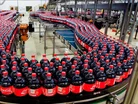Coca-Cola's 2035 Sustainable Manufacturing Vision

The Coca-Cola Company has set new voluntary goals in its manufacturing to bolster water security, reduce packaging waste, and curtail Scope 3 emissions.
These goals have been extended to 2035, highlighting the manufacturer's commitment to driving the future of sustainable manufacturing.
Coca-Cola operates in 200 countries, offering over 200 brands like Sprite, Fanta, Coca-Cola, Dasani, and Costa Coffee.
With expansive operations, the beverage manufacturer has worked to shrink its environmental imprint across operations.
Replenishing water
Water represents a critical asset for Coca-Cola, pivotal not only for crafting its products but also for bolstering the communities and ecosystems around its operations.
Since 2015, the company's endeavour to return at least 100% of the water utilised in its finished products back to nature and local communities has either met or surpassed its targets.
The freshly cast plan zeroes in on 200 locations deemed high-risk worldwide, ensuring full replenishment of the water used in these locales.
These spots, constituting about a third of its operating breadth, undergo rigorous analysis to confirm their vulnerability, with assessments scheduled every five years.
This ensures that the most critical areas receive focused attention and resources.
Alongside replenishment, Coca-Cola seeks to intensify its efforts in water efficiency, stewardship, and treatment practices, intending to safely reintroduce treated water back to communities.
“We remain committed to building long-term business resilience and earning our social licence to operate through our evolved voluntary environmental goals," says Bea Perez, Executive Vice President and Global Chief Communications, Sustainability & Strategic Partnerships Officer at Coca-Cola.
"We know we will have more chapters in our journey and that we can’t do it alone. Continued collaboration, targeted investments and well-designed policies are crucial to help create shared value for all.”
Increasing recycled packaging
Committing to a future with less waste, Coca-Cola is seeking to boost its adoption of recycled materials within its packaging spectrum by 2035.
The target is set: 35% to 40% of primary packaging made from from recycled sources, including 30% to 35% recycled plastic on a global scale. Elsewhere, the pursuit to recover 70% to 75% of its introduced bottles and cans each year is ambitious.
More than 95% of Coca-Cola's packaging is already designed to be recyclable, underscoring its commitment to a circular economy within its manufacturing processes.
Light-weighting efforts, or using less material per packaging, also feature prominently. This reduces the requirement for new, virgin plastic, aiding in the reduction of emissions, albeit dependent on material costs and technological advancements.
Coca-Cola also empowers refillable packaging solutions in regions where such systems are established, collaborating with government bodies, other industry players and civil societies to enhance collective environmental goals.
Reducing Scope 1, 2 and 3 emissions
Coca-Cola pledges a strong commitment to reduce its Scope 1, 2, and 3 emissions — encompassing direct operations, purchased electricity, and integrated supply chains — adhering to the Paris Agreement's 1.5°C requirement.
This roadmap, using 2019 as a baseline, targets considerable emission cuts by 2035.
The transition to renewable energy sources, embracing novel technologies, and teaming with bottling partners and other suppliers form the crux of its strategy to tackle emissions.
This initiative not only aids in controlling its direct environmental impact but also fortifies its overarching climate-responsive measures.
A commitment to ethical sourcing
Despite stepping away from crafting new agriculture-specific targets, Coca-Cola remains ardent about sustainable sourcing.
Its strategy includes a rigorous focus on water conservation, deforestation prevention and shielding vulnerable supply chain segments.
These actions support not just the environment but also elevate the livelihoods of countless farmers and suppliers involved with Coca-Cola’s vast global network.
Committing to annual sustainability progress reports, the company ensures its goals remain in sync with prevailing market demands and stakeholder expectations, cementing its role as a frontrunner in sustainable manufacturing within the beverage industry.
Explore the latest edition of Manufacturing Digital and be part of the conversation at our global conference series, Manufacturing LIVE.
Discover all our upcoming events and secure your tickets today.
Manufacturing Digital is a BizClik brand.
- Coca-Cola HBC & Romania’s Largest Circular Economy ProjectProduction & Operations
- Volvo CE Earns First Climate Efficient Site CertificationSustainability & ESG
- Coca-Cola and Heineken Address Scope 3 in ManufacturingSustainability & ESG
- UK Automotive Manufacturers Face Net Zero ChallengeSustainability & ESG



